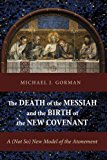
The Death of the Messiah and the Birth of the New Covenant: A (Not So) New Model of the Atonement PDF
292 Pages·2014·0.4207 MB·other
Most books are stored in the elastic cloud where traffic is expensive. For this reason, we have a limit on daily download.
Preview The Death of the Messiah and the Birth of the New Covenant: A (Not So) New Model of the Atonement
Description:
In this groundbreaking book, Michael Gorman asks why there is no theory or model of the atonement called the "new-covenant" model, since this understanding of the atonement is likely the earliest in the Christian tradition, going back to Jesus himself. Gorman argues that most models of the atonement over-emphasize the penultimate purposes of Jesus' death and the "mechanics" of the atonement, rather than its ultimate purpose: to create a transformed, Spirit-filled people of God. The New Testament's various atonement metaphors are part of a remarkably coherent picture of Jesus' death as that which brings about the new covenant (and thus the new community) promised by the prophets, which is also the covenant of peace. Gorman therefore proposes a new model of the atonement that is really not new at all--the new-covenant model. He argues that this is not merely an ancient model in need of rediscovery, but also a more comprehensive, integrated, participatory, communal, and missional model than any of the major models in the tradition. Life in this new covenant, Gorman argues, is a life of communal and individual participation in Jesus' faithful, loving, peacemaking death. Written for both academics and church leaders, this book will challenge all who read it to re-think and re-articulate the meaning of Christ's death for us.
See more
The list of books you might like
Most books are stored in the elastic cloud where traffic is expensive. For this reason, we have a limit on daily download.
